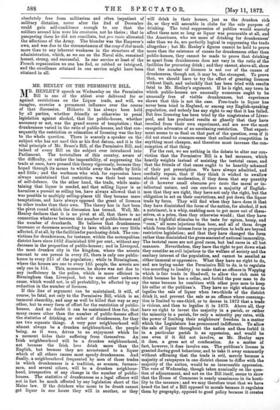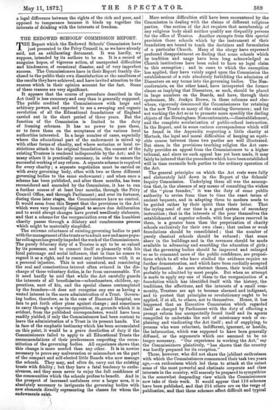MR. HENLEY ON THE PERMISSIVE BILL.
MR. HENLEY'S speech on Wednesday on the Permissive Bill is one of the ablest ever delivered for or against restrictions on the Liquor trade, and will, we
imagine, exercise a permanent influence over the course of that discussion. Hitherto it has al ways been held by all parties, whether friendly or otherwise to penal legislation against alcohol, that the public-house, whether necessary or not, was the grand source of temptation ; that drunkenness varied in the ratio of public-houses, and that con- sequently the restriction or relaxation of licensing was the key to the whole question. There is scarcely a speaker on the subject who has not used this as his first datum, and it is the vital principle of Mr. Bruce's Bill, of the Permissive Bill, and indeed of every Bill on the subject ever introduced into Parliament. The teetotallers of this country, aware of the difficulty, or rather the impossibility, of suppressing the trade at once, have pressed this theory vigorously, because they hoped through its means to whittle away the traffic by little and little ; and the workmen who wish for repression have always maintained that restriction was their best means of self-defence. On the other hand, the trade, while main- taining that liquor is needed, and that selling liquor is as harmless a pursuit as selling tea, have always allowed that it was possible to multiply selling-places till they became mere -temptations, and have always opposed the grant of licences to other trades than their own. The theory has in fact been
-the pivot round which the discussion has turned. Well, Mr.
Henley declares that it is no pivot at all, that there is no connection whatever between the number of public-houses and the number of drunkards. He believes that drunkenness increases or decreases according to laws which are very little affected, if at all, by the facilities for purchasing drink. The con- victions for drunkenness, for instance, within the metropolitan district have since 1832 diminished 400 per cent., without any decrease in the proportion of public-houses ; and in Liverpool, the most drunken city in the kingdom, where the arrests amount to one person in every 23, there is only one public- house to every 215 of the population ; while in Birmingham, where the houses are one to every 185 people, the arrests are only one in 154. This, moreover, he shows was not due to any inefficiency in the police, which is more efficient in Birmingham than Liverpool, but to some other unknown cause, which would not, in all probability, be affected by any reduction in the number of licences.
If this line of argument can be maintained, it will, of course, be fatal, not only to the Permissive Bill, which is an immoral absurdity, and may as well be killed that way as any -other, but to every form of effort for the restriction of public- houses. And no doubt it can be maintained thus far, that many causes other than the number of public-houses affect -the statistics of drinking, or rather of drunkenness, for they -are two separate things. A very poor neighbourhood will almost always be a drunken neighbourhood, the people being, as it were, driven to an enjoyment which for a moment hides their suffering from themselves. An Irish neighbourhood will be a drunken neighbourhood, not because the Irish love drink more than the English, but because they are accustomed to a liquor which of all others causes most speedy drunkenness. And finally, a neighbourhood frequented by men of those trades in which drunkenness is a tradition, as seamen, furnace- men, and several others, will be a drunken neighbour- hood, irrespective of any change in the number of public- houses. The statistics of drunkenness as a legal offence will not in fact be much affected by any legislation short of the Maine law. If the drinkers who mean to be drunk cannot get liquor in one house they will in another, or they will drink in their houses, just as the drunken rich do, or they will assemble in clubs for the sole purpose of drinking. The total suppression of publics would scarcely affect these men so long as liquor was procurable at all, and the Americans, who see more of drinking for drunkenness' sake than we do, are perfectly logical in suppressing the trade altogether ; but Mr. Henley's figures cannot be held to prove more than the existence of causes for drunkenness other than public-houses, they cannot be made to prove that drinking as apart from drunkenness does not vary in the ratio of the facilities for procuring drink ; and they cannot, above all, show
that the number of licences is not one of the causes of
drunkenness, though not, it may be, the strongest. To prove that, we should have to try the effect of granting licences without limit, and unluckily that has been tried with results fatal to Mr. Henley's argument. If he is right, any town in which public-houses are unusually numerous ought to be unusually free of visible drunkenness, but experience shows that this is not the case. Free-trade in liquor has never been tried in England, or among any English-speaking population, and nobody has any right to say that it has failed. But free licensing has been tried by the magistrates of Liver- pool, and has produced results so ghastly that they have recoiled from their own experiment, and are now the most energetic advocates of an unrelaxing restriction. That experi- ment seems to us final on that part of the question, even if it did not stand to common-sense that unlimited competition in anything must cheapen, and therefore must increase the con- sumption of that thing.
For the rest, we see nothing in the debate to alter our con- viction that the Permissive Bill is a bad measure, which heavily weights instead of assisting the teetotal cause, and that the friends of that cause ought to be heartily ashamed of their pet prescription. We have always admitted, and
cordially repeat, that if they think it wicked to swallow alcohol even in moderation, if they deem that any quantity of it however small obscures pro tanto the moral or in- tellectual nature, and can convince a majority of English- men that they are right, they have not only the right, but the obligation to act on their convictions, and put down the liquor trade by force. They will find when they have done it that they have diminished the force of the nation, for alcohol, if not a nutriment, is a whip, enabling men to get more out of them- selves, at a price, than they otherwise would ; that they have given a frightful stimulus to the taste for opium, hemp, and "coca," all more injurious than beer, and all of them drugs which from their intense force in proportion to bulk are beyond restrictive legislation; and that they have changed the form rather than diminished the gross amount of national immorality. The teetotal races are not good races, but bad races in all but manners. Nevertheless, they have the right to put down what they consider an evil injurious to the welfare of society and the sanitary interest of the population, and cannot be assailed as either immoral or oppressive. What they have no right to do, and are trying under the Permissive Bill to do, is to regulate vice according to locality ; to make that an offence in Wapping which is fair trade in Shadwell, to allow the rich man to drink because he has a cellar, and forbid the poor man to do the same because he combines with other poor men to keep his cellar at the publican's. They have no right whatever to legalise the sale of liquor when two-thirds of the district drink it, and prevent the sale as an offence where consump- tion is limited to one-third, or to decree in 1872 that a trade is vicious, and then to legalise it in 1873. Above all, they have no right to invest the majority in a parish, or rather the minority in a parish, for only a minority pay rates, with the power of limiting their neighbours' freedom in a matter which the Legislature has pronounced indifferent. To allow the sale of liquor throughout the nation and then forbid it in a particular parish is an oppression, and would be one even if it did not involve, as Mr. Henley says it does, a gross act of confiscation. As a matter of fact, however, it does involve one. The publican's license is granted during good behaviour, and to take it away summarily without affirming that the trade is evil, merely because a majority of ratepayers in one district choose to differ with the majority of the nation, would be an inexcusable oppression. The vote of Wednesday, though taken nominally on the ques- tion of adjournment, and not on the Bill itself, seems to show that the House of Commons is nearly unanimous in its hosti- lity to the measure ; and we may therefore trust that we have heard the last of a Bill opposed to morals because it regulates them by geography, opposed to good policy because it creates
a legal difference between the rights of the rich and poor, and opposed to temperance because it binds up together the interests of drinking with the interests of freedom.



































 Previous page
Previous page